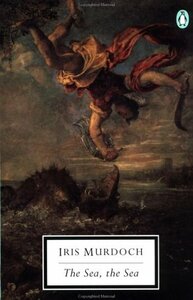Take a photo of a barcode or cover
She does it all for a breaker: Iris Murdoch’s study of descent into utter madness by way of preening self-regard, narcissistic OCD, moral vacuity and solipsism has echoes of hanging around in bars, looking for the one. Not just that narrator Charles Arrowby could as easily have been gay as straight - this was written in a less fluid time but one tetchy theatrical tart is as good as another - his complete certainty that he is right, regardless of evidence and the views of his friends to the contrary, is resonant. Norma Desmond in a cardigan and brogues. Picky and pedantic, he has a host of minor and unimportant snobberies, particularly around food, where his descriptions of how to cook and eat resemble Damian Trench, In and Out of the Kitchen’s domestic tyrant. There’s a slight concern that in capturing the tortured internal monologue, Murdoch has uncovered the Caliban in all of us - not so much a conversation with oneself as never-ending argument, punctuated by hissed insults and sulky silences. Of course with Tinder or Grindr, none of these events would have happened. Oh I do miss the good old days.
medium-paced
Plot or Character Driven:
A mix
Strong character development:
Yes
Loveable characters:
Complicated
Diverse cast of characters:
No
Flaws of characters a main focus:
Yes
Oh, Charles.
dark
emotional
hopeful
mysterious
tense
slow-paced
One of the strangest books I have ever read. I don't think it had aged well. Some very good parts but is certainly drags on for too long
Fascinada estoy con el virtuosismo de Iris Murdoch y conmocionada con su personaje, Charles Arrowby, tan egocéntrico, inmoral y caprichoso!
La novela es de difícil lectura y de relectura obligada, inclasificable y poliédrica. En mi opinión, no es apta para todos los lectores ni para cualquier momento.
Mención especial merece el último párrafo. Nunca leí un punto y final tan bueno!
La novela es de difícil lectura y de relectura obligada, inclasificable y poliédrica. En mi opinión, no es apta para todos los lectores ni para cualquier momento.
Mención especial merece el último párrafo. Nunca leí un punto y final tan bueno!
The blurb on the book cover of my edition talks of "a rich, crowded, magical love story" but this book is nothing of the sort. It is the story of an obsession, albeit an obsession which the narrator believes to be love, of an exceptionally self-centred man. Recently retired from a successful career in the theatre as actor, then playwright and director, Charles Arrowby tries to get away from it all at a lonely, ugly house close by the sea somewhere in the north of England. The first section of the book, called 'Prehistory', focuses on the house, its location and the sea itself. We are treated to detailed descriptions of Arrowby's healthy but recherché meals and some inkling of his past life, including nostalgic recollection of the one woman he says he loved, Hartley, a childhood sweetheart who abruptly disappeared from his life when he left his home town to become an actor.
Action accelerates in the main section of the book when Charles discovers that Hartley, now an unattractive older woman long married to an ex-soldier Ben, is actually living in retirement with her husband in a bungalow at the other end of the village. Convinced that fate has brought them together again and that Hartley is the victim of an unhappy marriage, Charles first tries to persuade her to leave her husband and then practically kidnaps her, keeping her locked up in a small room in his house, trying to convince her to live with him. The environment is enlivened with visits from Charles's theatre friends and lovers. Women such as Lizzie, who appears devoted to him and prepared to give up the equilibrium she has found with the homosexual Gilbert to become enslaved to Charles again, and the ex-lover Rosina, who left her husband for Charles and remains a vibrant jealous woman, who, although she no longer appears to want Charles for herself, does not want to see him with anyone else such as Lizzie. Then there is the mysterious cousin James, of whom Charles himself appears to have been jealous since childhood. The situation is further complicated by the arrival of Titus, the adopted son of Ben and Hartley, who had run away from home. The suspicion that Charles is his biological father is quickly and convincingly denied but Titus remains at Charles's house and there is a bonding between the two to the extent that Charles convinces himself that he wants to adopt the boy as his own son.
Even after Hartley returns to her husband, Charles continues to be convinced that what she really wants is to be with him. He fantasizes about caring for her. It is a mark of Murdoch's skill that the obsession is convincing even though Hartley is depicted as an unattractive, weak, bewildered character who has long consigned Charles to the realms of a childhood sweetheart gone on to make a success in a world far apart from her own reality. This reality is her marriage to Ben, for better or worse - as Peregrine Arbelow, Rosina's first husband says, "Every persisting marriage is based on fear." But Charles has no experience of this, having been much loved but never married. The domesticity of Ben and Hartley's marriage is underlined in their final invitation to Charles for afternoon tea, when they tell him of their plans to emigrate to Australia. Even at this point, Charles remains convinced that Hartley will escape to be with him and it is only when he discovers they have already left, earlier than announced, leaving behind the last letter he had written to Hartley unopened, that he acknowledges that Hartley has gone.
The brooding sea, described in many moods from slick and still to a boiling cauldron, from a source of great pleasure for diving and nude bathing, to a threat whose thrashing waves against the vicious rocks prevent the exit of weary swimmers, is itself more of a character than a setting for the story. It is fitting that the Postscript, Life Goes On at the end of the book takes places away from the sea and back in London. It is almost as if the sea and Charles' obsession were inseparable and the return to London is a return to the everyday.
Action accelerates in the main section of the book when Charles discovers that Hartley, now an unattractive older woman long married to an ex-soldier Ben, is actually living in retirement with her husband in a bungalow at the other end of the village. Convinced that fate has brought them together again and that Hartley is the victim of an unhappy marriage, Charles first tries to persuade her to leave her husband and then practically kidnaps her, keeping her locked up in a small room in his house, trying to convince her to live with him. The environment is enlivened with visits from Charles's theatre friends and lovers. Women such as Lizzie, who appears devoted to him and prepared to give up the equilibrium she has found with the homosexual Gilbert to become enslaved to Charles again, and the ex-lover Rosina, who left her husband for Charles and remains a vibrant jealous woman, who, although she no longer appears to want Charles for herself, does not want to see him with anyone else such as Lizzie. Then there is the mysterious cousin James, of whom Charles himself appears to have been jealous since childhood. The situation is further complicated by the arrival of Titus, the adopted son of Ben and Hartley, who had run away from home. The suspicion that Charles is his biological father is quickly and convincingly denied but Titus remains at Charles's house and there is a bonding between the two to the extent that Charles convinces himself that he wants to adopt the boy as his own son.
Even after Hartley returns to her husband, Charles continues to be convinced that what she really wants is to be with him. He fantasizes about caring for her. It is a mark of Murdoch's skill that the obsession is convincing even though Hartley is depicted as an unattractive, weak, bewildered character who has long consigned Charles to the realms of a childhood sweetheart gone on to make a success in a world far apart from her own reality. This reality is her marriage to Ben, for better or worse - as Peregrine Arbelow, Rosina's first husband says, "Every persisting marriage is based on fear." But Charles has no experience of this, having been much loved but never married. The domesticity of Ben and Hartley's marriage is underlined in their final invitation to Charles for afternoon tea, when they tell him of their plans to emigrate to Australia. Even at this point, Charles remains convinced that Hartley will escape to be with him and it is only when he discovers they have already left, earlier than announced, leaving behind the last letter he had written to Hartley unopened, that he acknowledges that Hartley has gone.
The brooding sea, described in many moods from slick and still to a boiling cauldron, from a source of great pleasure for diving and nude bathing, to a threat whose thrashing waves against the vicious rocks prevent the exit of weary swimmers, is itself more of a character than a setting for the story. It is fitting that the Postscript, Life Goes On at the end of the book takes places away from the sea and back in London. It is almost as if the sea and Charles' obsession were inseparable and the return to London is a return to the everyday.
"'Stop crying, Hartley, you look like the pig-baby in Alice, like you used to.'"
I can see that this book would definitely work as one to study in university or high school. It feels like there was a lot going on. Charles is a theatre director who has recently retired to a seaside village where he has bought a gross house next to the sea. There is no electricity, it’s super damp, I’m not sure why he was so keen to buy it. Coincidentally this village is the same one where his first love has also recently moved with her husband. Charles then goes about trying to completely blow up her life thus forcing her to abandon her husband and come to him. Though she manages to resist him. No one seems very great in this book. Charles is terrible, just completely un aware of the sort of person he is. His first love and the husband also seem pretty bad. Being kind of happy when their kid dies. The nicest character was Charles’ cousin who also dies in super mysterious circumstances. A very odd book.
This book is so long that reading 30% feels like I’ve read what would otherwise be a full novel. This book is interesting but it is so long and very character driven. I need action and find the main character to be incredibly obnoxious.
I should have liked this book, but I didn't. The main character was an obsessive jerkball. I found him, and therefore the book, inexpressibly tedious.
Anyone want to recommend some other Iris Murdoch for me?
Anyone want to recommend some other Iris Murdoch for me?




